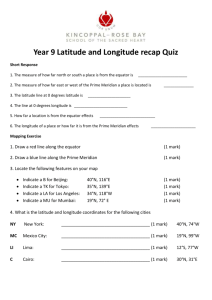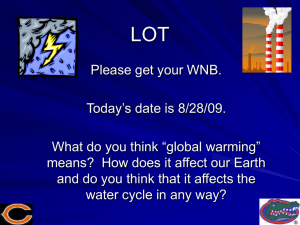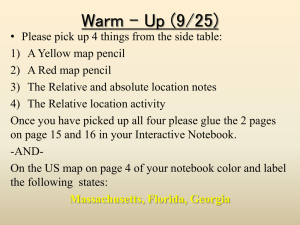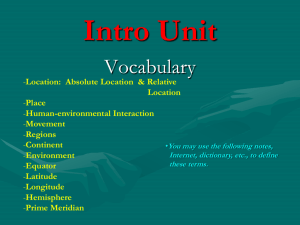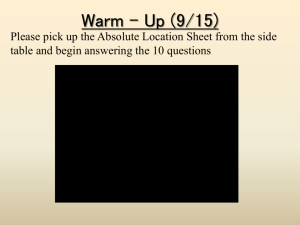LATITUDE AND LONGITUDE
advertisement
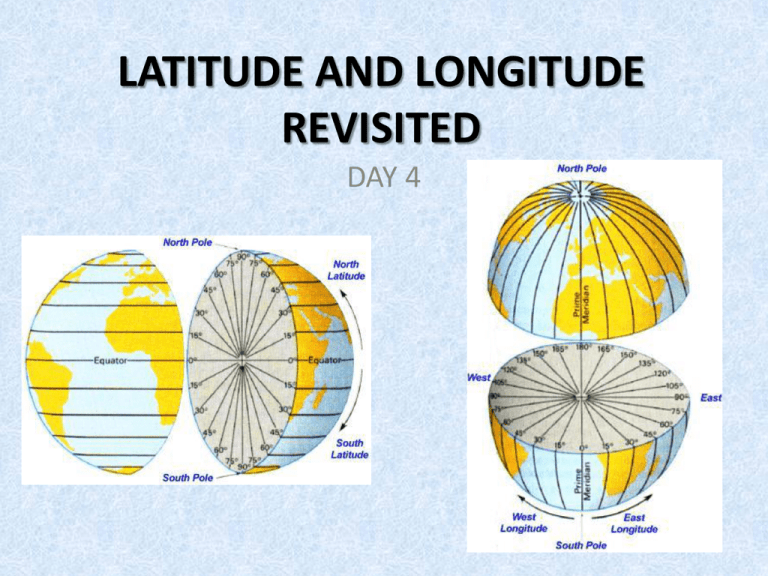
LATITUDE AND LONGITUDE
REVISITED
DAY 4
Latitude lines are imaginary lines on the earth's
surface that run east and west. They tell you your
distance in degrees north or south of the Equator.
Think of latitude like the rungs of a ladder (ladder
sounds like latitude) that also run east and west.
Longitude lines are imaginary lines on
the earth's surface that run from the
North Pole to the South Pole,
encircling the globe. They and tell
you your distance in degrees east or
west of the Prime Meridian. When
you think of longitude, think of long,
tall telephone poles (because
longitude lines run from pole to pole).
Why Degrees?
In the field of mathematics, circles are measured in
degrees. There are 360° in a circle. Since the earth is
basically circular, it was decided to measure latitude
and longitude in degrees also.
EQUATOR
The Equator is equally distanced
between the north and south poles.
It is the longest of all latitude lines. (Look at this line
of latitude compared to others on a globe.)
All other latitude lines are measured in degrees
north or south of the Equator.
Altogether there are 90 degrees of latitude to the
north and 90 degrees of latitude to the south of the
Equator.
PRIME MERIDIAN
The Prime Meridian lies at 0°
longitude. All other longitude lines
are measured in degrees east or west
of the Prime Meridian. There are a
maximum of 180 degrees on
longitude to the east or the west of
the Prime Meridian.
For more accuracy in location,
degrees can be divided into smaller
parts. One degree can be divided into
60 minutes (') and one minute can be
divided into 60 seconds (").
Using Latitude and Longitude to
Pinpoint a Location
•If someone asked you the location of McDonalds, you may
say: "It is at the intersection (corner) of Airline Drive and
Viking Drive."
•Latitude and longitude are like imaginary streets on the
earth. The place where the two lines intersect (cross) is the
absolute location.
•It is customary to list the latitude of a place first and the
longitude second.
•For example, you would say "35° N, 77° W". This eliminates
the need to say the words latitude and longitude.
•Make sure that you give a direction with the number. If you
simply say "66° latitude", there are two of them - one is
north and one is south.
Finding Latitude
To find a latitude line such as 60° N,
you must do three things:
1. Begin at your starting line (the Equator).
2. Determine which direction you must go (north
or south).
3. Determine the distance in degrees you must
go (ex. 60°). This will give the location of one
of your two map location points.
Finding Longitude
To find a longitude line, you must
To find
also
do a longitude line such as 60° W,
you must do three things:
Thre
e things:
1. Begin at your starting line (the Prime Meridian).
Go to your starting line (the Prime Meridian).
2. Determine which direction you must go (east or
west).
1. Determine
which direction you must go (east
or west).
3. Determine the distance in degrees you must go
(ex. 60°). This will give the location of the second
2. Determine the distance in degrees you must go
of your two map location points.
(ex. 40°). This will give the location of the
If you find the intersection of these two lines, you
have found the exact (absolute) location of a
particular place on the earth's surface (shown by the
red "X" on the map below).
Important: The equator
is neither North nor
South of the starting
line, so it is simply 0°
latitude (no direction
needed). The prime
meridian would be 0°
longitude (no direction
needed).
In real life, there are several instances where you would
need to know how to find latitude and longitude. For
example, when weather forecasters are tracking hurricanes,
they note the absolute location on a periodic basis to see
the path of the storm and try to predict the future path
based partially on these findings.
Another example would be in the
military. Suppose you were at war
and you wanted to blow up an
ammunition factory, but not the
hospital nearby. Using minutes and
seconds of latitude and longitude,
you can launch a missile from
hundreds of miles away and strike
only that particular building.
In an emergency situation, like a plane crash or a ship
sinking, you can relay your coordinates of latitude and
longitude to assist rescue teams when time may be very
important. If you are in the middle of an ocean, there are no
landmarks to use, so you had better know your latitude and
longitude.
In the event of a 911 emergency, the address
associated with phone number from which the call is
made is not necessarily the location to which
emergency responders will be sent. The Federal
Communications Commission requires that all
network operators provide the latitude and
longitude of the place from which the call was
placed.
Let’s see what you have learned about
Latitude and Longitude.
In which hemispheres would each of these absolute
locations be found (choose the correct letter)?
A
B
C
D
1. 41°N, 21°E
2. 37°N, 76°W
3. 72°S, 141°W
4. 7°S, 23°W
5. 15°N, 29°E
6. 34°S, 151°E
1. B
2. A
3. C
4. C
5. B
6. D
The United States is which
direction from the Prime
Meridian?
A) West
B) South
C) East
D) North
Which letter marks the spot where the
Prime Meridian and the Tropic of Capricorn
intersect (cross)?
The answer is C
In which hemispheres do the Tropic
of Cancer and the Equator intersect?
A) Northern and Western
B) Southern and Eastern
C) Northern and Eastern
D) None of the above
If you said D, then great job! These are both lines of
latitude, which means they are parallel, and as you know
parallel lines NEVER intersect!!!
